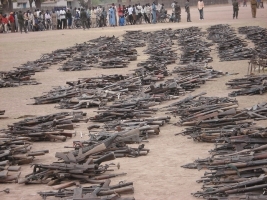South Sudan disarmament was poorly planned – report
March 28, 2009 (WASHINGTON) — A new report by Small Arms Survey describes the disarmament campaign ordered last year by President Salva Kiir Mayardit as “poorly planned, highly decentralized, and inadequately supported by the Government of South Sudan.”
 The campaign was partly coercive, but “the process was largely non-violent, mainly due to weak implementation in many areas” said the report. This contrasts with a bloody campaign in 2006, especially in Lou Nuer areas.
The campaign was partly coercive, but “the process was largely non-violent, mainly due to weak implementation in many areas” said the report. This contrasts with a bloody campaign in 2006, especially in Lou Nuer areas.
Based on field work in five states but focusing on only three—Lakes, Western Equatoria and Unity—the study assesses the disarmament campaign that took place from June through the end of November last year.
The author, Adam O’Brien, has worked as a journalist and political analyst, most recently covering the conflict in northern Uganda and peace talks between the Government of Uganda and the Lord’s Resistance Army in Juba. He is a lawyer.
Disarmament began across South Sudan last year after a May 22 order by Salva Kiir Mayardit, the president and commander of the South’s armed forces. The order authorized the use of force against those who refused to surrender weapons and were seen as threatening state forces.
Three case studies form the core of the paper: Lakes State, Western Equatoria and Unity State. O’Brien described the efforts in Unity State as a top-down, militaristic approach that was counter-productive and sowed resentment. Yet he was more positive about the effort in Lakes state, where “a more considered approach prevailed,” whereas Western Equatoria state authorities largely disregarded the disarmament order.
In his conclusions, the author is highly critical of the planning for the disarmament, even challenging its legal basis.
“The order was issued in the absence of the necessary legal and policy frameworks, with poorly defined objectives, and without adequate guidelines” he said.
“Indeed, the manner in which the campaign was conceived—in consultation with just a few powerful individuals within the GoSS and SPLA—raises many questions about the motivations underlying it. If its real goals were to consolidate power prior to elections or to diffuse escalating militarization it is questionable whether this kind of campaign was an appropriate strategy to adopt.”
Given these criticisms, the report laments the fact that the campaign began before the fledgling Community Security and Small Arms Control (CSSAC) Bureau had obtained a legal mandate and could play an active role in coordinating the process.
The Small Arms Survey is an independent research project located at the Graduate Institute of International and Development Studies in Geneva, Switzerland. It was established in 1999.
(ST)
